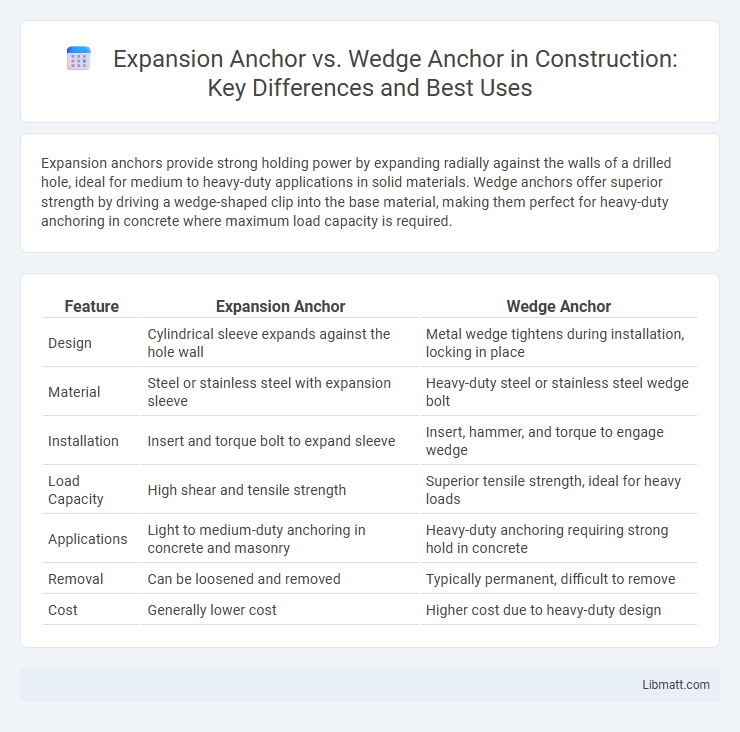Expansion anchors provide strong holding power by expanding radially against the walls of a drilled hole, ideal for medium to heavy-duty applications in solid materials. Wedge anchors offer superior strength by driving a wedge-shaped clip into the base material, making them perfect for heavy-duty anchoring in concrete where maximum load capacity is required.
Table of Comparison
| Feature | Expansion Anchor | Wedge Anchor |
|---|---|---|
| Design | Cylindrical sleeve expands against the hole wall | Metal wedge tightens during installation, locking in place |
| Material | Steel or stainless steel with expansion sleeve | Heavy-duty steel or stainless steel wedge bolt |
| Installation | Insert and torque bolt to expand sleeve | Insert, hammer, and torque to engage wedge |
| Load Capacity | High shear and tensile strength | Superior tensile strength, ideal for heavy loads |
| Applications | Light to medium-duty anchoring in concrete and masonry | Heavy-duty anchoring requiring strong hold in concrete |
| Removal | Can be loosened and removed | Typically permanent, difficult to remove |
| Cost | Generally lower cost | Higher cost due to heavy-duty design |
Introduction to Expansion Anchors and Wedge Anchors
Expansion anchors provide secure fastening in concrete by expanding against the drilled hole as the bolt is tightened, ideal for medium to heavy loads. Wedge anchors feature a slotted, conical section that wedges into the concrete, delivering superior holding power for heavy-duty applications. Your choice between expansion and wedge anchors depends on load requirements and the specific concrete conditions of your project.
What is an Expansion Anchor?
An expansion anchor is a type of mechanical fastener designed to secure objects to concrete or masonry surfaces by expanding against the walls of a drilled hole when tightened. It creates a strong, reliable hold through radial pressure, making it ideal for medium to heavy-duty applications such as attaching fixtures or structural elements. Expansion anchors are commonly used in construction and renovation projects due to their ease of installation and excellent holding power under vibration or shear forces.
What is a Wedge Anchor?
A wedge anchor is a heavy-duty anchor designed for concrete applications, featuring a slotted, expandable clip at the base that securely grips when tightened. It provides high load capacity and excellent resistance to pullout forces, making it ideal for structural and safety-critical installations. Your choice between a wedge anchor and an expansion anchor depends on the specific strength requirements and installation environment.
Key Differences Between Expansion and Wedge Anchors
Expansion anchors create a secure hold by expanding against the walls of a drilled hole through a sleeve or collar, ideal for light to medium loads in concrete, brick, or block. Wedge anchors rely on a mechanical wedge that tightens and locks firmly inside the hole as the anchor bolt is tightened, providing high strength and reliability for heavy-duty applications. The primary difference lies in their installation mechanism and load capacity, with wedge anchors offering superior performance under dynamic or substantial stress conditions.
Material Compatibility: Expansion vs Wedge Anchors
Expansion anchors offer superior material compatibility with concrete, brick, and stone due to their design that exerts even pressure along the hole walls, minimizing damage and ensuring secure fastening. Wedge anchors, typically made of steel or stainless steel, provide high-strength fastening primarily in solid concrete but may cause stress fractures in more brittle materials, limiting their use. Selecting the appropriate anchor type based on substrate hardness and material composition is crucial for long-term durability and load-bearing performance.
Load Capacity Comparison
Expansion anchors typically provide higher load capacities due to their mechanical interlock with the base material, making them suitable for heavy-duty applications in concrete and masonry. Wedge anchors also offer strong load-bearing capabilities but generally have slightly lower maximum load ratings compared to expansion anchors of the same size and material. Engineers must assess specific load requirements and environmental conditions to select the optimal anchor type for structural stability.
Installation Methods: Step-by-Step Guide
Expansion anchors install by drilling a hole, inserting the anchor, and tightening the bolt to expand the sleeve against the hole walls, creating a secure hold. Wedge anchors require drilling a hole to match the anchor diameter, inserting the anchor, and hammering the wedge into place, then tightening the nut to lock the anchor firmly into the substrate. Proper hole depth and diameter, cleaning out debris, and using the correct tightening torque are critical for both anchors to ensure maximum load-bearing capacity and safety.
Typical Applications for Expansion Anchors
Expansion anchors are commonly used in medium-duty applications such as fastening machinery, shelving, and handrails to concrete or masonry surfaces. They provide reliable holding power in solid materials, making them ideal for securing items like HVAC equipment, electrical panels, and structural supports. Suitable for both indoor and outdoor environments, expansion anchors ensure stability in applications where vibration and load stresses are moderate.
Typical Applications for Wedge Anchors
Wedge anchors are commonly used for heavy-duty applications in concrete such as securing structural steel columns, machinery bases, and safety barriers. Their high-strength design allows them to withstand substantial shear and tensile loads in dynamic environments including industrial facilities and commercial construction projects. Typical uses also include fastening railings, light poles, and large equipment where reliable load transfer and vibration resistance are critical.
Choosing the Right Anchor for Your Project
Expansion anchors provide reliable holding power in solid concrete by expanding against the hole walls, making them ideal for heavy-duty structural applications requiring high load capacity. Wedge anchors, designed with a tapered end that wedges into the concrete as the bolt is tightened, offer superior resistance to vibration and dynamic loads, making them suitable for projects involving machinery or outdoor installations. Selecting between these anchors depends on concrete condition, load requirements, and environmental factors to ensure optimal support and safety in your construction project.
Expansion anchor vs wedge anchor Infographic

 libmatt.com
libmatt.com